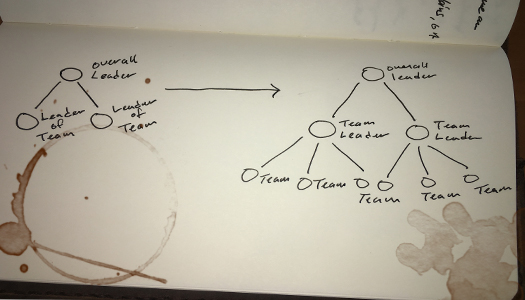 This past summer we had our largest Vacation Bible School and this past weekend we wrapped up our largest Fall Festival in decades for the church. In both of these instances we had a follow up meeting with those who helped lead these ministries and outreach efforts. In both cases we came to the same conclusion/agreement – we have to move from individual leader/s to teams. This transition marks a very important change in the church culture (at least in the children’s ministry).
This past summer we had our largest Vacation Bible School and this past weekend we wrapped up our largest Fall Festival in decades for the church. In both of these instances we had a follow up meeting with those who helped lead these ministries and outreach efforts. In both cases we came to the same conclusion/agreement – we have to move from individual leader/s to teams. This transition marks a very important change in the church culture (at least in the children’s ministry).
What Happens If We Don’t Change How We Operate?
If we continue to grow while maintaining the same structure, it will cause damage to the organization. Its similar to a child wearing shoes several sizes too small — pain, discomfort, and eventual discarding the shoes all together. Those leaders who are in key places of your effort, if they are pushed past a certain point, then they will grow overwhelmed as in a wave of a tsunami. Growth can always be challenging, but if it is not properly managed it can lead to burnout and people bing hurt. We begin the process by asking:
Do We Really Want to Continue to Grow?
 It is easy for organizations and leaders to get to a point where they are happy with the size. They say to themselves “this far and no further.†If we don’t change how we operate then damage will happen, the performance that is driving the growth will stop, and the growth levels will stop and adjust to how you have reacted to these new challenges. Change is necessary at every step of growth. So, as the leader you have to determine if this is the point where we need to change, or do we continue to do what we are doing because it is working.
For our team, the next step of growth is to push down to another level in the organization. In Vacation Bible School one leader cannot do crafts, Bible story, etc. we must transition to a team of people leading crafts, Bible story, etc. Our rooms are not big enough, and there are simply too many people in a given area.
With Fall Festival there are simply too many details that have to get accomplished in a limited window of time (after church but before the event starts). In Fall Festival we need to move toward a team of people leading with one person over food, another over games, another over registration, etc. In both of these instances we are moving from one leader to teams.

What are the Challenges to This New Growth Step?
- Communication. When moving from one person leading everything communication with multiple levels of people can be difficult. Once they could simply send out a letter to helpers, have a meeting, and all information is easily communicated. But when a level is added to the organization communication becomes more complex. In an age of Facebook, twitter, etc. look for tools that will help you in this developing and more complex effort. Everyone does not need to know ever detail – now you must divide communication into who needs to know what is essential to their departments.
- Training. Leaders move from doing everything themselves to delegating to second tier leaders. The primary leader shouldn’t do anything that deals with (insert responsibility, food ex.) instead he/she should delegate this item to the (insert team leader, food ex.) and trust this team to take care of it.
This is often difficult for a leader who is used to doing everything themselves. In this process of handing off responsibility to others, the main leaders should make sure people know what they need to know and have the resources they need to do their job.
- Recruiting. With this new tier of leadership there are new people in the room. The main leader and their team are comfortable with how they have done things up to this point, and there is probably a level of rapport. These new leaders have to be allowed into the leadership circle. The old days need to stay in the past and not brought to the table — a new day is here with new people at the table.
- Budgeting. Spending can get out of hand quick if teams are given free reign on spending. With one leader, it is much easier to keep track of spending, but now individual departments have to be given budgets to make sure things stay on track.Â
- Meetings. Meetings are held as departments instead of the team as a whole. There is nothing more frustrating than to be in a meeting that has little to do with you or your department. There will be times when the whole team needs to meet (vision casting, theme reveal, discussing the event as a whole, etc.) but many times it would be better if individual teams meet at a time convenient for them, and they can discuss what is essential to them.
I am very excited to see what God is doing in our ministry, and am constantly challenged by Him in areas where I need to grow. This is the wonder of ministry, our job is never done, and we are never able to say, “done.” There will always be families and friends that need to hear about Jesus. The more He stretches me and grows me, the better equipped I am to reach the lost. How about you? What challenges are you facing in your ministry?